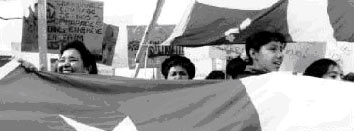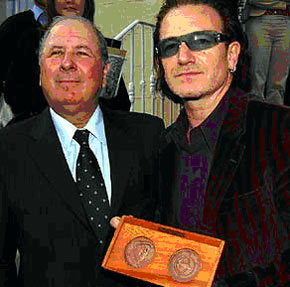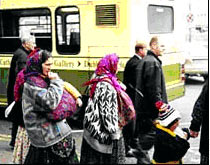|
The most significant reason for the minister's reluctance,
however, is revealed in the same letter, where Cooney stated
that most or all of the group were refugees because they were
Marxists, and that a significant proportion were 'activists.'
He feared that they would engage in political agitation soon
after their arrival in Ireland; 'they will not change their outlook on arrival in this
country.' [15] He suggested that such left-wing activists
would pose a far greater problem for Ireland
than for other Western European countries because of the
existence in Ireland of 'a relatively large and well-organised subversive group
towards whom such persons could be expected to gravitate.'
[16] Cooney proposed some form of screening programme to vet
potential refugees. [17] This forced migration of refugees
from Chile
to Ireland
was further complicated by Cooney's suggestion that some of
the refugees were in fact non-Chileans who had sought refuge
in Chile because it had a communist president. [18]
The Irish state played a minimal role in facilitating their
settlement in the country, and for security reasons, the event
received muted publicity due to the danger of releasing their
names to the Chilean media. The resettlement was privately
financed by the Committee for Chilean Refugees in Ireland and by religious groups.
[19] The Chileans who had arrived
seeking refuge in Ireland
were housed in local authority houses in Shannon, County Clare, and in Galway and
Waterford, and were allocated places on AnCo training schemes.
[20]
Many received training in metalwork. [21] After two
years, the Committee for Chilean Refugees in Ireland ceased to provide direct aid to the community, ostensibly to
promote personal autonomy. [22] It was only in 1977, three
years after the arrival of the group in Ireland, that
provisions were made for teaching the English language to
adult refugees, and even at that stage, only two hours'
tuition per week were provided. [23]
|

Protest against deportation by
Chilean refugees in Canada, 1998
(Gunther Gamper)
|
In response to a parliamentary question in early 1977, a
representative for the then Minister for Foreign Affairs,
Garret FitzGerald, stated that the minister 'maintained an
active interest in the welfare of the Chilean refugees in Ireland
and the efforts made on their behalf.' [24] At that time,
there were twenty-three Chilean heads of family living in Ireland; a total of ninety-four people. However, the representative
underlined the fact that the Department of Foreign Affairs was
not directly involved in providing assistance to the Chileans.
Local and national authorities were providing assistance to
the group and 'considerable progress has been made towards
their integration here.' Nevertheless, three years after their
arrival in Ireland, the Chileans who had settled in Galway
were reported to be experiencing continuing difficulties in
finding suitable employment. [25]
Little is known about the daily lives and achievements of the
group during their residence in Ireland. Some are known to have continued third-level studies at
Trinity College
in Dublin. [26] One Chilean refugee, Maite Deiber, whose husband had
been arrested and 'disappeared' during the unrest in Chile, went on to become conductor of the Trinity College Singers
in Dublin in 1978. [27] Very few of the 120 or so Chilean refugees who
arrived in Ireland in the early 1970s remain in the country. They experienced
serious difficulties in finding employment in Ireland due to a lack of targeted language or training programmes to
facilitate their integration into the labour market. [28] In
the late 1980s, the Chilean government announced an amnesty
for Chileans abroad who had been exiled by the coup, and many
of the refugees returned.
|

Chilean
Ambassador Alberto Yoacham presents the 'Pablo Neruda Medal
of Honour' to the Irish rock star Bono, for his contribution to music and humanitarian
causes,
23 September 2004
(AP photo/ John Cogill) |
Relations between Ireland
and Chile are naturally influenced by the activities of Irish migrants
in the region during the nineteenth century. While the most
significant migration of the twentieth century between the two
countries was the small-scale movement of programme refugees
between Santiago and Dublin during the 1970s, during the
twenty-first century Ireland is likely to be the destination
for many more Chilean immigrants. On being awarded an Honoris
Causa Doctorate by the University
of Chile
in 2004, the Irish President Mary McAleese commented on the
continuing potential for cooperation between the Republics of
Ireland and Chile:
No
es casual que Bernardo O'Higgins sea conocido como El Libertador. Estuvo entregado al espíritu de la libertad
iluminada. Es mi convencimiento que Irlanda [...] cuenta con
un socio legítimo en la República de Chile, con el cual
estamos destinados a trabajar más estrechamente a fin de
propagar aún más los frutos de ese espíritu de libertad a
lo largo de América Latina y el mundo. [29]
However, aside from the resettlement project in 1974, from
the 1960s to date, Irish governments have remained remarkably
silent in relation to dirty wars and 'disappearances' in Latin America, in contrast to many of the country's European neighbours.
Although many victims of forced disappearances in Chile
and Argentina had Irish names, - and therefore obvious Irish ancestry -
diplomatic and consular services consistently refused to get
involved. [30]
Most of the Chileans living in Ireland today are on short-term work permits or have married Irish
people and settled here. In 2002, there were a total of eight
Chileans working in Ireland on work permits and one Chilean architect on a work
authorisation issued by the Department of Enterprise, Trade
and Employment. By 2004, this number had increased to twenty
Chileans on permits and two professionals on authorisations,
and further increased to twenty-four Chileans working in Ireland
on work permits and one engineer on an authorisation in 2005.
In 2006, however, just five work permits for Chileans were
renewed, and six new permits and one authorisation were issued.
[31]
Trade between Ireland
and Chile has been growing significantly, and was valued at just under
€74 million in 2002, a fourfold increase since 1990.
Ireland
is represented in Chile
by an honorary consul, and general diplomatic representation
is handled by the Irish embassy in Argentina. The Embassy of Chile in
Ireland
opened on 1 July 2002, and in October of the same year, the first ever resident
Chilean ambassador in Dublin, Alberto Yoacham, presented his credentials to the President
of Ireland.
|

Romanian
refugees in Ireland, 2001
(http://www.cnn.com/SPECIALS/2001)
|
In the years that followed the settlement of the Chilean
refugees, many more people arrived in Ireland seeking refuge under UNHCR programmes, including Vietnamese
(1979-2000), Iranian (1985), Bosnian (1992-2000) and Kosovar
(1999) people in search of safety and freedom from
persecution. Ireland is one of only seventeen countries in the world with a
programme of refugee resettlement. In mid-2005, the Irish
Minister for Justice announced that Ireland was to significantly increase its annual refugee resettlement
quota from 10 cases - equating to about forty people - to 200
people per year. In light of the fact that Ireland recognised 966 asylum seekers as refugees and received about
70,000 immigrants during 2005 alone, [32] the resettlement
quota remains modest. The implementation of further increases,
however, seem likely, as Ireland continues to adapt and
develop its policies for the settlement of those who seek
refuge on the island.
The twentieth-century settlement of refugees, and indeed
other immigrants, in Ireland is a topic that has thus far received little attention in the
field of academic research. This is despite the implications
of Ireland's history of immigration for the future of the country. The
examination of the small-scale settlement of these South
Americans seeking refuge in the country may prove informative
with regard to future resettlement projects, and sheds light
on a little known connection between Ireland
and Chile.
Claire Healy
|




